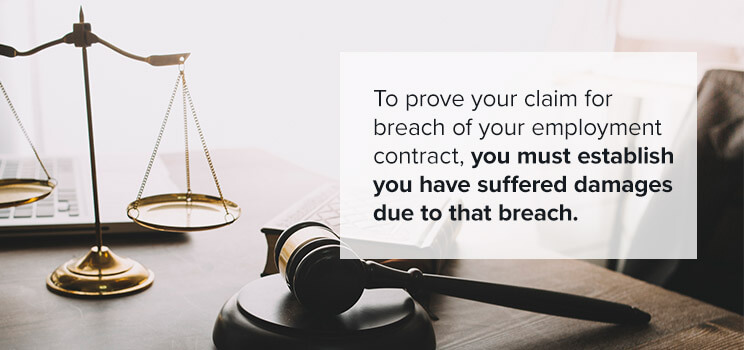Contracts safeguard the relationship between parties. A typical example of such a relationship is an employer-employee relationship. Employment contracts outline the terms of employment between the employer and employee and govern other aspects of that relationship, including the employee’s title, duties, part-time or full-time status, period of employment, pay and benefits and so on.
When a party breaches an employment contract, the other party may be entitled to certain reliefs. How do you know if you have a claim for a breach of an employment contract? There are a few areas to understand before you can answer this question.
Can You Sue Your Employer for Breach of Contract?
Before instituting legal action against your employer for breach of the contract, consider these issues:
1. Who Is an Employee?
An employee is an individual who provides services to an employer in exchange for a salary or wages. The employer supervises the employee and determines the employee’s duties. Whether the employer hires you as an employee or independent contractor, your relationship may be governed by a contract, expressly or impliedly. The agreement may also be oral or written.
2. What Is an Employment Contract?
The answer to this question is fundamental to assessing whether or not an employer is liable for breaching an employment contract. Generally, a contract is an agreement between parties containing an exchange of promises. The same applies to an employment contract, but an employment contract is specific to employment relations.
3. What Is the At-Will Doctrine?
Employment contracts may be at-will or for a specified period. At-will contracts may operate as a presumption, and the law deems the employment relationship at-will when the contract does not stipulate a specific duration.
In Pennsylvania, many employment contracts are at-will, meaning any party can terminate the agreement at any time, with or without reason and without legal consequences. The rule, to an extent, makes it challenging for employees to protect themselves, but there are exceptions to the at-will doctrine. The at-will law operates by default — therefore, the employment contract may modify the rule by providing specific outlines. If the dismissal violates an express term in the agreement, your employer may be liable for unlawful termination.
There are State laws that protect employees against unlawful termination. Federal regulations also provide exceptions to this sort of arrangement. These include public policy, implied contracts and good faith exceptions:
Public policy
The law protects employees against unlawful termination of employment when the action taken contravenes public interest. For example, your employer may be liable if they dismiss you because you:
- Refused to perform an illegal act.
- Reported a breach of the law.
- Performed a legal duty.
- Exercised a statutory duty.
Implied Contracts
Such contracts are challenging to prove. However, you can establish this exception by oral guarantees made by one party. Under certain circumstances, the work policy, employee handbook and the employment’s known practices may also qualify as implied contracts. Thus, even without a written agreement, implied contracts may be enforceable.
For instance, where the implied contract guarantees you a fixed employment duration, the at-will rule may not apply. The law generally disregards promises that guarantee life-long employment or similar.
Discrimination as a Statutory Exception
The law prohibits employers from discriminating against employees. Your employer may be in breach of the employment contract if they terminate your employment based on your race, gender, religion, age, national origin, ancestry or disability. The relevant laws concerning discrimination in Pennsylvania include:
- Title VII of the Civil Rights Act of 1964
- The Pennsylvania Human Rights Act of 1955
- Americans with Disability Act of 1990
- Age Discrimination in Employment Act of 1967
- Family and Medical Leave Act of 1993
4. How Do You Prove a Breach of an Employment Contract?
Proving a breach of employment contract requires you to satisfy three fundamental elements:
- The contract must be valid and enforceable.
- The employer must breach that contract.
- The breach must result in damages.
Valid and Enforceable Contract
A contract may be oral, written or partly oral and written. The law requires certain contracts to be in writing. A valid contract generally must contain five essential elements:
- Offer
- Acceptance of that offer
- Capacity to contract
- Intention to create legal relation
- Consideration
Your employment contract must meet all these requirements. When satisfying the requirement of sufficient consideration in an employment contract, you must prove you have surrendered some legal right to obtain some benefit, such as showing you have offered your services to an employer in exchange for wages or salary.
Breach of Contract
A valid contract binds the parties to the terms contained in that agreement. If any party breaches a term of the contract, the other party may have a claim. In other words, when you fail to perform a duty as specified in the contract, your employer may take action against you. The same applies where the employer is in breach.
The breach that entitles you to a claim must be material. It must affect your performance of the contract substantially. The law determines the materiality of the breach on a case-by-case basis. However, certain factors guide the court, such as:
- The nature of the breach.
- The extent to which the breach deprives the other of their claims under the contract.
- The defaulting party’s conduct to ascertain whether or not they acted in good faith.
This list is not exhaustive. When an employer terminates your employment contract and that termination contravenes any exception to the at-will doctrine, you may have a claim for breach of contract. An employment attorney can help by analyzing all the relevant facts before offering legal advice.
Resultant Damages
To prove your claim for breach of your employment contract, you must establish you have suffered damages due to that breach. The damages must be reasonably foreseeable. In other words, you must link your sustained damages to the breach — both parties should be able to predict that outcome.
The aim is to place you in the position you would have had if both parties had successfully completed the contract. This involves assessing your wages or salary and any amount you could have earned while searching for an alternative job. The court also considers if you attempted searching for a new job diligently and any other monetary loss arising from the breach.
However, the damages must be reasonably certain. This means you should be able to prove how much you would have gained if the breach had not occurred. It would help if you tried to mitigate any loss.
You may have a claim for breach of the employment contract if you successfully proved all these requirements.
5. Should You Contact an Employment Attorney?
Reaching out to an employment attorney is the final and most important of the five lessons. Employment attorneys have the experience and training to help you access your claim if any. Share your challenges with an attorney for advice before taking the necessary steps if you think you have a case involving a breach of your employment contract.
Get a Free Consultation From Weisberg Cummings
Weisberg Cummings is a Pennsylvanian-based law firm with more than 40 years of combined experience handling all types of employment law matters. Our lawyers can assist you by assessing if you have a claim for breach of your employment contract.
Our lawyers are versed in financial issues, employment matters and discrimination claims. We help you protect your rights. Call us now at (855) 716-2367 or contact us online to request a free consultation.



